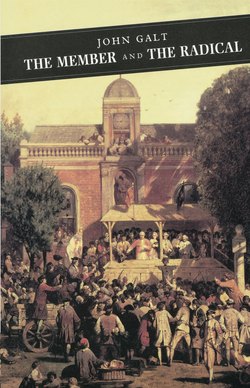Читать книгу The Member And The Radical - John Galt - Страница 14
На сайте Литреса книга снята с продажи.
ОглавлениеCHAPTER EIGHT
I found, on inquiry, that Frailtown was, a decayed place, and that Physickspring was fast flourishing in repute – that in a few years it had outnumbered Frailtown by a great deal – and that from the time the Duchess of Driveabout had made it her place of resort, the visitors were most genteel and select; insomuch, that for one letter that went to Frailtown, a score at least went to Physickspring. This assured me that the separate post-office that was to be established would beat the old one all to shivers. I likewise learned, that the post-office in Frailtown had been long kept by the widow of a former mayor, who had brought up a decent family of daughters in the church of England and the Christian religion; and that since the increase of Physickspring they were well to do in the world, being milliners. It was therefore very plain to me, that the new establishment would not only be a great drawback on them, but a total loss to old Edward Dawner, the man that distributed the letters in Physickspring.
This, it will be seen, was a case that required prudent handling; and I resolved to weigh the whole circumstances thereof in a judicious balance. At first, my natural inclination was to advise the milliners to move their business to Physickspring, and to keep old Edward Dawner as the postman to go with the letters to Frailtown; in fact, just to reverse the practice. I heard, however, that the Misses Stiches had the whole business of Frailtown, which they would lose if they removed to Physickspring, where they had no chance of success, as a fashionable nymph of the gumflowers, from London, had forestalled the trade. Indeed, I saw that when a man obtains a share in the distributions of the good things of Government, it behoves him not to allow himself to be overly yielding to his natural tender feelings; and thus I was constrained, by a public duty, to make the best arrangement I could in the difficulties of the case; and what I did, got me great respect over all that country side. I got an inkling from the post-office concerning the value of the postmastership of Frailtown, the which I saw was very handsome in moderation. I therefore wrote to Mr. Spicer, that I had got a conditional grant of the office for his son-in-law, but which I was afraid made it so little worth, that he would not think of accepting the same – that the conditions were to the effect that one Edward Dawner was to be indemnified by an annual sum of money, whenever the postmaster’s allowance exceeded thirty pounds a-year – I had ascertained that it was well on to four times that amount; and that Mrs. Stiches was likewise to have an indemnity, and should be paid, whenever the emoluments exceeded fifty pounds a-year clear, all surplus till she had five-and-twenty pounds a-year.
After stating these particulars to Mr. Spicer, I said to him, in my letter, that he would tell his son-in-law what I would do for him, provided that the place, with such burdens, was an object.
As I expected, back in course of post came a letter accepting the offer, but in a cool way. The arrangement, however, was greatly applauded by the inhabitants of the borough, as well as by the gentry at Physickspring, and every one there said it consisted with reason that there should be a post-office at such a growing place; and that it shewed I was a man of reflection and observation to put such a judicious idea into the head of Government. In short, I was a very popular member; and I must say, though I say it myself, deservedly so. ‘Deal small, and serve all,’ was an ancient proverb that I gave great heed to; and the first session of my parliamentary career shews that I understood its application.
So much anent the second administration of my influence in my first session, when I was in a manner innocent of the ways and means of dealing with patronage. As I became better acquainted with the usages of Parliament, no doubt I grew more dexterous; but on no future occasion did I ever make such a sensible appropriation as on those just mentioned, which I partly attribute to my being a fresh hand in the business – ‘new brooms’, as the saying is, ‘sweep clean’; and I was then spank new in ministerious trafficking: indeed, I had then more leisure, and had time to consider what I was about; but afterwards, as will be shewn by and by, when I came to have my hands full of committee-work, private bills, and local affairs, I could afford less time to attend to the distribution of the salaries in the manner I have described; and here it becomes me to make a very cogent remark.
In those days there had been none of that heresy about savings, which has been such a plague both to ministers and members of late years. We then all sat each under his vine and fig-tree; and there was then really some enjoyment in making the people happy, especially those who had for friends members that were of the salutary way of thinking. I am, however, anticipating much of what I have to relate, and the sore changes that have come to pass among us since that fatal night when a late member betrayed us, by calling our right to share in the patronage by the ignominious epithet of candle-ends and cheese-parings; for, ever since, it has been thought that we we have been wanting to our own wisdom in being so inveterate to retain the distribution of places and pensions – the natural perquisites of Members of Parliament.
